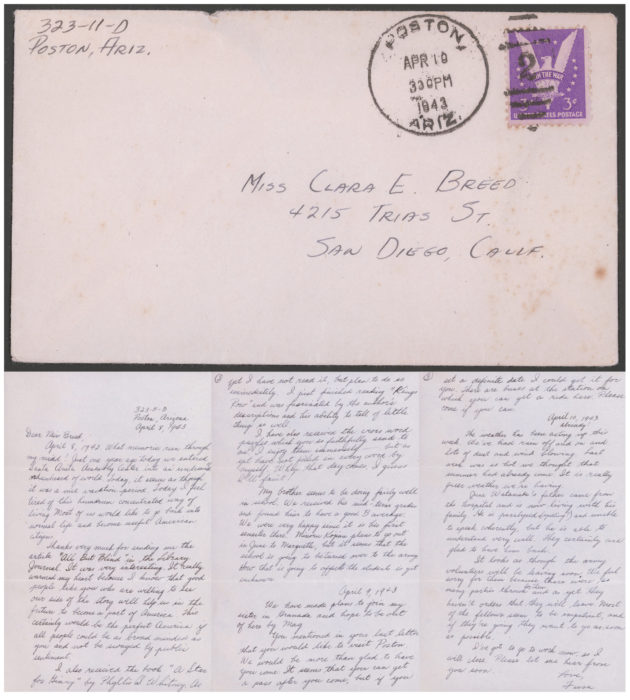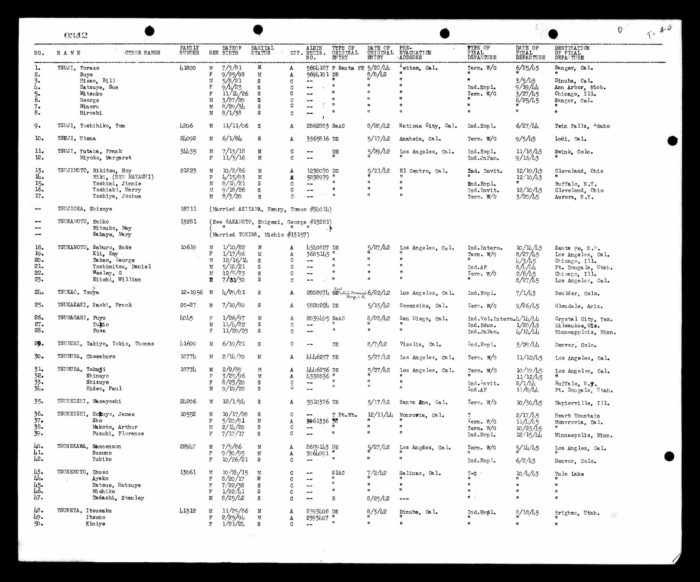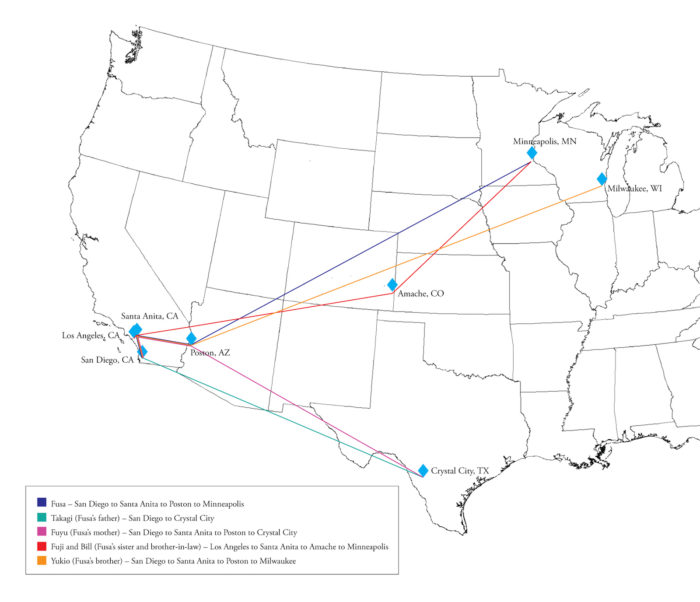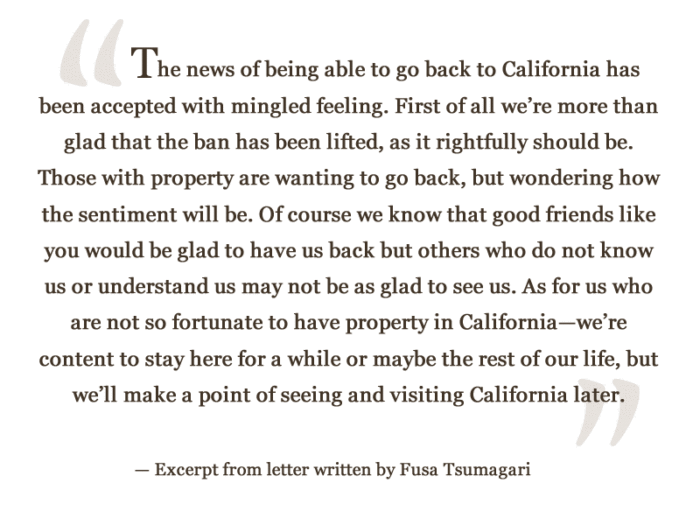Letter Home

Clara Breed Collection, Japanese American National Museum, Gift of Elizabeth Y. Yamada (93.75.31EW)
Click to open full-size image in new tab.Here are a letter and envelope. Read the text of the letter carefully and note all the signs of migration that are described. Consider the following questions:
- To whom is this letter written?
- Where does the recipient live?
- Who wrote this letter?
- Where does the writer live?

Courtesy of National Archives and Records Administration
Click to open full-size image in new tab.The United States government kept records for all the individuals who were incarcerated during World War II. This is the record for Fusa Tsumagari, who wrote the letter to Miss Breed.
- What does the letter reveal about Fusa?
- Where was she before the war?
- Where did she go after the war?
- Fuyu Tsumagari is her mother. Where did Fuyu go after the war?
- Yukio Tsumagari is her brother. Where did Yukio go after the war?

Tsumagari family migration map
Click to open full-size image in new tab.Japanese American families experienced a great deal of migration and displacement during this period. Many families such as Fusa’s were split up with individual family members going to different places for various reasons. This map shows some of the places that the Tsumagari family members lived before, during, and after World War II.
- San Diego, California: This is where Fusa and her family lived before the war. It is also where Miss Breed lived.
- Los Angeles, California: This is where Fusa’s sister and brother-in-law, Fuji and Bill, were living before the war.
- Crystal City, Texas: Fusa’s father, Takagi, was sent to a Department of Justice camp here in 1942; her mother, Fuyu, joined him upon leaving Poston in April 1944. Fusa also went here with her mother before going to Minneapolis.
- Santa Anita, California: The Tsumagari family was sent to the Santa Anita Assembly Camp in April 1942.
- Poston, Arizona: Fusa, along with her mother and her brother, Yukio, were sent to a concentration camp here in August 1942.
- Amache, Colorado: Fuji and Bill were sent to the concentration camp here in September 1942.
- Milwaukee, Wisconsin: Yukio left Poston in January 1943 to attend college here at Marquette University. Japanese American college students weren’t able to study on the West Coast, but they could attend school if they could find a college to accept them in a state that wasn’t on the coast.
- Minneapolis, Minnesota: After leaving Amache, Fuji and Bill went here in April and May of 1943 to work. Fusa joined them after leaving Poston in April 1944 and found a job as a typist at a department store.

Clara Breed Collection, Japanese American National Museum, Gift of Elizabeth Y. Yamada (93.75.31S)
Click to open full-size image in new tab.This is an excerpt from another letter Fusa wrote to Miss Breed. Miss Breed was the children’s librarian at San Diego Public Library from 1929 to 1945. When her young Japanese American patrons were forced into concentration camps with their families in 1942, Miss Breed became their reliable correspondent, sending them books and assisting with requests for supplies. Through her actions, she served as a reminder of the possibility of decency and justice in a troubled world.
When Fusa wrote this letter, she had already left camp in Poston, Arizona, and moved to Minneapolis, Minnesota, where her sister and brother-in-law were living.
- How would you describe the tone of this letter excerpt?
Even without reading the letters Miss Breed wrote to her students, one can find many things revealed in letters the students wrote to her.
- Based on the content of this letter, what can you conclude about Miss Breed?
- What evidence brings you to those conclusions?

Clara Breed Collection, Japanese American National Museum, Gift of Elizabeth Y. Yamada (93.75.31EW)
Click to open full-size image in new tab.It was not uncommon for Japanese Americans to take different migration paths from other family members. There were many reasons for this. In some cases, the head of household was removed first and taken away. In the Tsumagari case, Fusa’s father was first taken to a Department of Justice camp. College-aged Japanese Americans, such as Fusa’s brother Yukio, could go to schools farther inland, away from the coast if they could find a school willing to accept them. Since Fusa’s sister Fuji and brother-in-law Bill lived in Los Angeles, they were sent to a different camp from Fusa, who was living in San Diego. The concentration camp to which individuals were sent was most often determined by their residence at the time of incarceration. After being released from camp, securing a job often determined where an individual resettled. Work is what drew Fusa to take a different path from her mother after leaving Poston and join Fuji and Bill, who were working in Minneapolis.
Return to Migration
